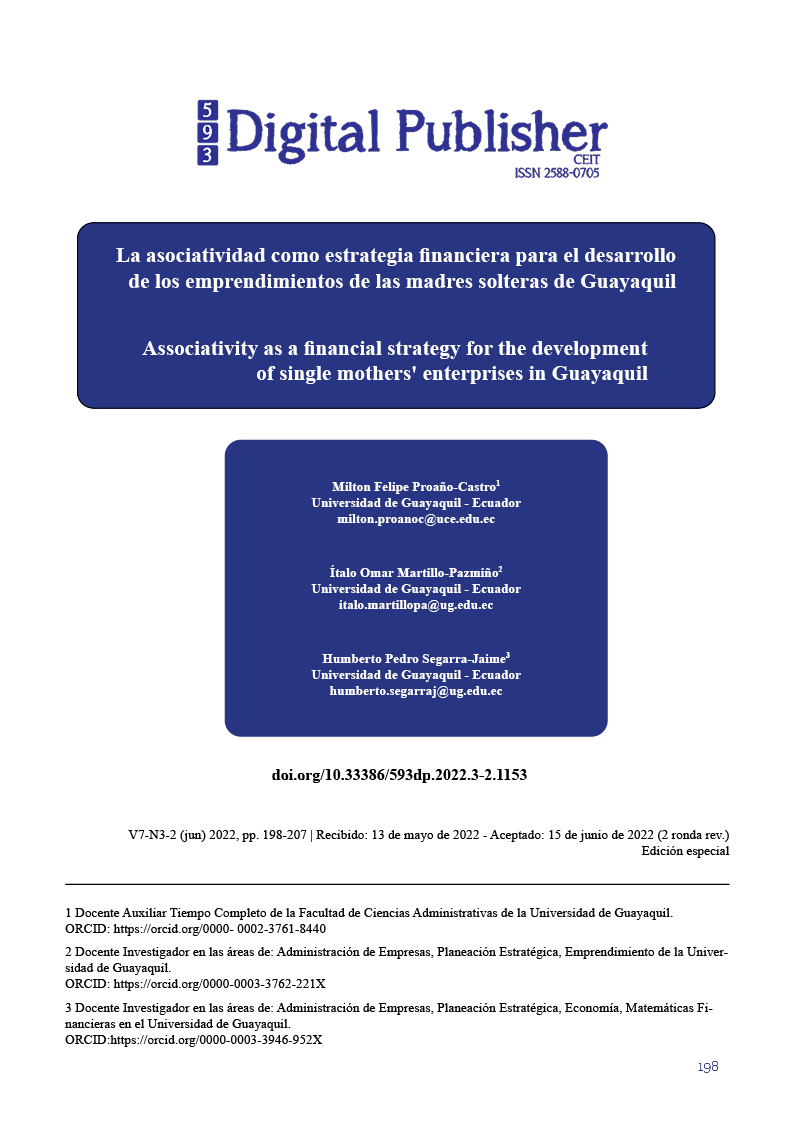Associativity as a financial strategy for the development of single mothers' enterprises in Guayaquil
Main Article Content
Abstract
The objective of this research is to analyze associativity as a financial strategy for the development of the enterprises of single mothers in Guayaquil. The methodology used is bibliographic design and documentary type where it is intended to describe the operation, the advantages, disadvantages and characteristics of this financial strategy used by single mothers in Guayaquil for their ventures. Associativity refers to the group of people who have come together voluntarily to meet their needs and achieve common economic, social and cultural aspirations through a jointly owned and democratically controlled company. It is necessary that the State and other public or private entities disseminate the financial strategy of associativity with a greater proportion so that single mothers establish ventures and know how they work, what their benefits are, their weaknesses and advantages so that the State can notice greater interest in this group of women capable of achieving their goals and achieving common objectives, such as giving their families a better future, achieving economic benefits and being able to support their gender, obtaining economic, social and cultural empowerment in the country.
Downloads
Article Details

This work is licensed under a Creative Commons Attribution-NonCommercial-ShareAlike 4.0 International License.
1. Derechos de autor
Las obras que se publican en 593 Digital Publisher CEIT están sujetas a los siguientes términos:
1.1. 593 Digital Publisher CEIT, conserva los derechos patrimoniales (copyright) de las obras publicadas, favorece y permite la reutilización de las mismas bajo la licencia Licencia Creative Commons 4.0 de Reconocimiento-NoComercial-CompartirIgual 4.0, por lo cual se pueden copiar, usar, difundir, transmitir y exponer públicamente, siempre que:
1.1.a. Se cite la autoría y fuente original de su publicación (revista, editorial, URL).
1.1.b. No se usen para fines comerciales u onerosos.
1.1.c. Se mencione la existencia y especificaciones de esta licencia de uso.
References
Alianza Cooperativa Internacional. (2018). Descubre de qué forma las cooperativas construyen un mundo mejor. Recuperado el 04 de Mayo de 2022, de ¿Qué es una cooperativa?: https://www.ica.coop/es/cooperativas/que-es-una-cooperativa
Alvarado-Choez, D., Barreto-Madrid, R., & Baque-Cantos, M. (2021). Emprendimiento e innovación del sector microempresarial ecuatoriano durante la pandemia covid-19. Polo del Conocimiento, 6(56), 2144-2164. doi:10.23857/pc.v6i3.2497
Banco Mundial. (14 de Octubre de 2017). Ayudar a las empresas de propiedad de mujeres a avanzar al siguiente nivel. Recuperado el 30 de Abril de 2022, de https://envivo.bancomundial.org/llevar-las-empresas-de-propiedad-de-mujeres-al-siguiente-nivel
BanEcuador. (2022). Crédito Mujer Emprendedora. Recuperado el 02 de Mayo de 2022, de https://www.banecuador.fin.ec/creditoscpcs/creditomujeremprendedora/
Barreto, E., & Gutierrez, B. (2021). Estrategias financieras para el uso del microcrédito como instrumento de emprendimiento para el desarrollo económico de las madres solteras del noroeste de la Ciudad de Guayaquil. Trabajo de grado, Universidad de Guayaquil, Guayaquil. Obtenido de http://repositorio.ug.edu.ec/handle/redug/55493
Briseño, O., Briseño, A., & López, A. (2016). El emprendimiento femenino: un estudio multi-caso de factores críticos en el noreste de México. Innovaciones de Negocios, 13(25), 23-46. Obtenido de https://revistainnovaciones.uanl.mx/index.php/revin/article/view/77/71
Cervantes, X., Murillo, G., & Liberio, F. (2021). Estrategias para el fortelecimiento de emprendimientos informales. Revista Tecnológica Ciencia y Educación Edwards Deming, 5(2), 117-130. Obtenido de http://revista-edwardsdeming.com/index.php/es/article/view/84/146
Contreras, B., Parrales, C., & Macías, E. (2019). Mecanismos financieros de ayuda para las madres solteras ecuatorianas. En O. Mejía, & B. De la Hoz, I Congreso Internacional de Fiscalidad y Finanzas (págs. 35-48). Guayaquil, Ecuador. Obtenido de https://estudioidea.org/wp-content/uploads/2020/06/MEMORIAS-I-CONGRESO-INTERNACIONAL-DE-F-y-F.pdf
Enríquez, M. (2016). Los procesos de empoderamiento de las mujeres que se asocian para superar la pobreza-caso Redeps. Tesis para obtener el título de Maestría en Ciencias Sociales con mención en Género y Desarrollo, Facultad Latinoamericana de Ciencias Sociales. Obtenido de http://hdl.handle.net/10469/10771
Espinoza, D. (2017). El cooperativismo como herramienta del emprendimiento. En E. Jaime, El Emprendimiento en Ecuador: Visión y Perpectivas (págs. 54-68). Samborondón, Ecuador: Universidad Ecotec. Obtenido de https://www.ecotec.edu.ec/content/uploads/investigacion/libros/emprendimiento-ecuador.pdf
Espinoza, M., & Espinoza, M. (16 de Noviembre de 2020). El emprendimiento en Ecuador: Una revisión bibliográfica de su actual situación. Recuperado el 28 de Abril de 2022, de https://www.researchgate.net/publication/349108465_EL_EMPRENDIMIENTO_EN_ECUADOR_UNA_REVISION_BIBLIOGRAFICA_DE_SU_ACTUAL_SITUACION
Espinoza, O. (2017). Capacidades asociativas en emprendimientos de economía solidaria. El caso de las comunas Tsáchila de Santo Domigno en Ecuador. Tesis Doctoral, Universidad de Alicante. Obtenido de http://hdl.handle.net/10045/77460
Global Entrepreneurship Monitor, GEM. (2022). 2021/2022 Global Report. Opportunity Amid Disruption. Londres: Babson College. Obtenido de https://www.gemconsortium.org/
Ibarra, A., Gutiérrez, J., & Hidalgo, W. (2022). Propuesta de asociatividad en negocios informales afines. Caso madres solteras del noroeste de Guayaquil. Revista E-IDEA Journal of Business Sciences, 4(14), 57-76. doi:https://doi.org/10.53734/eidea.vol4.id189
Instituto Nacional de Economía Popular y Solidaria. (2022). El IEPS cree en ti mujer emprendedor. Recuperado el 02 de Mayo de 2022, de https://www.economiasolidaria.gob.ec/el-ieps-cree-en-ti-mujer-emprendedora/
Instituto Nacional de Estadísticas y Censos. (2019). Registro estadíctico de matrimonios y divorcios. Boletin Técnico N°01-2020 REMD, Quito. Obtenido de https://www.ecuadorencifras.gob.ec/documentos/web-inec/Poblacion_y_Demografia/Matrimonios_Divorcios/2019/Boletin_tecnico_MYD_2019.pdf
Lino, A. (2021). Asociatividad y su impacto socioeconómico en las actividades agrícolas de la asociación Los Laureles Parroquia Julcuy, año 2020. Proyecto de Investigación previo a la obtención del título de Economista, Jipijapa, Manabí. Obtenido de http://repositorio.unesum.edu.ec/bitstream/53000/3172/1/TESIS%20ANDREA%20LINO.pdf
López, S., & Márquez, L. (2021). Estrategias financieras para mejorar la rentabilidad de emprendimientos de madres solteras del noreste de la ciudad de Guayaquil. Tesis presentada como requisito para optar por el título de Contaduría Pública Autorizada, Universidad de Guayaquil, Guayaquil. Obtenido de http://repositorio.ug.edu.ec/handle/redug/58701
Mejía, O., Casquete, N., & Bautista, E. (2019). El microcrédito como instrumento de emprendimiento: Caso Ecuatoriano. En O. Mejía, & B. De la Hoz, 1er Congreso Internacional de Fiscalidad y Finanzas (págs. 17-34). Guayaquil, Ecuador. Obtenido de https://estudioidea.org/wp-content/uploads/2020/06/MEMORIAS-I-CONGRESO-INTERNACIONAL-DE-F-y-F.pdf
Orihuela-Ríos, N. (2022). Emprendimiento femenino: características, motivos de éxito, limitantes, involucrados, y consecuencias. INNOVA Research Journal, 7(1), 109-122. doi:https://doi.org/10.33890/innova.v7.n1.2022.1946
Secretaria Técnica Plan toda una vida. (2018). Toda una vida. Intervención emblemátiva. Misión menos pobreza mas deesarrollo. Quito: Gobierno de Ecuador. Obtenido de https://siteal.iiep.unesco.org/sites/default/files/sit_accion_files/11023.pdf




